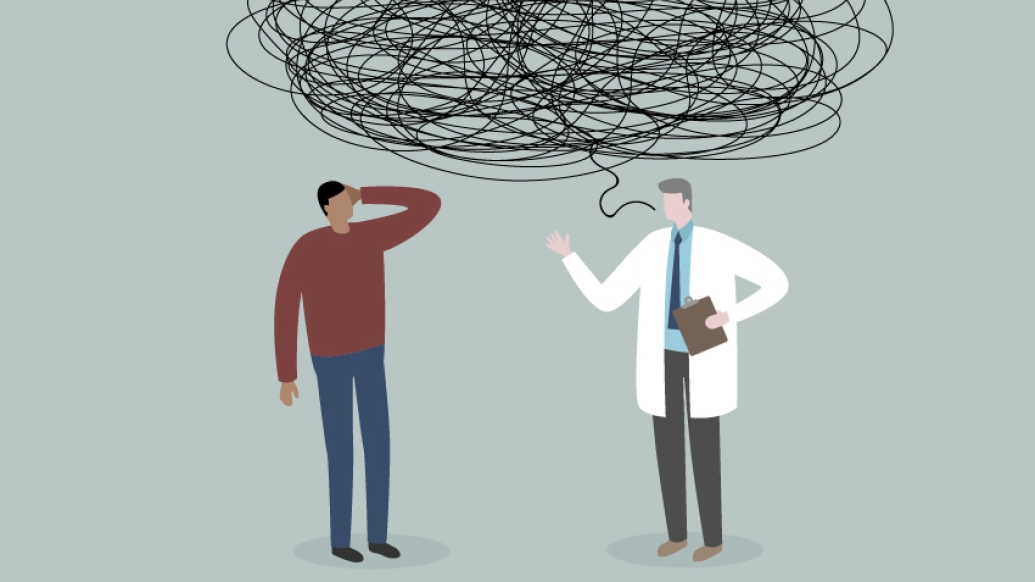A Rogel Cancer Center doctor offers tips to help patients leave their oncology appointments understanding their treatment.
1:00 PM
Author |

Cancer comes with a lot of information and a lot of emotion. That mix can make doctor visits tricky.
Doctors try to be clear as they walk through recommended treatments, explaining the possible risks and side effects. But the language involved in cancer care is complicated.
Patients are often stuck wondering what is a contraindication or an intervention? And what does oncology mean anyway?
LISTEN UP: Add the new Michigan Medicine News Break to your Alexa-enabled device, or subscribe to our daily audio updates on iTunes, Google Play and Stitcher.
"Most doctors are pretty good about explaining complex concepts. The word 'doctor' means teacher, and we take that seriously," says Reshma Jagsi, M.D., D.Phil., Newman Family professor and deputy chair of radiation oncology at Michigan Medicine.
"But as a whole, we are starting to realize we could do a much better job of providing forms and information that our patients can understand."
Jagsi and colleagues recently published a study that looked at the informed consent forms patients are given to sign before beginning radiation treatment. The forms are intended to outline what patients can expect during treatment, including possible side effects and other risks.
The researchers looked at 113 forms from cancer centers across the country. Only nine forms were at or below an eighth grade reading level, which is recommended. Some forms were equal to a 15th grade reading level, which implies about seven years of post-high school education.
The study was an eye-opener, Jagsi says, and the authors propose working with national organizations to make these documents easier to understand.
MORE FROM MICHIGAN: Sign up for our weekly newsletter
It's important because informed consent documents can be a helpful written reminder of a conversation with your doctor.
We try our best to sense what the patient is or is not following. We want to know what it is you didn't understand so we can correct that understanding.Reshma Jagsi, M.D., D.Phil.
But what do you do when the conversation feels no less complicated than the form?
"Your doctor is trying to listen but may not fully appreciate where you're coming from. We try our best to sense what the patient is or is not following," Jagsi says. "We want to know what it is you didn't understand so we can correct that understanding."
In cancer treatment, and radiation in particular, patients are often scared and nervous before treatment and report afterward that it wasn't as bad as they had expected.
"We don't want people to be unduly scared. We want to make the treatment as clear and transparent as possible," Jagsi says.
Try these six tips to leave your doctor's office truly informed:
-
Don't be afraid to say you don't understand. Doctors want you to know what to expect. If they aren't explaining it well, ask them to explain it again more simply. Ask them to draw a picture if that might help.
-
Take notes or ask a family member or friend to take notes. Even if you understand in the moment, having your notes to refer to, in terms you understand, might be helpful later.
-
Ask for any forms or brochures at the beginning of the conversation and mark them up during the appointment. Add explanations that make sense to you.
-
Restate what you think you heard and ask your doctor if you're understanding correctly.
-
Make a list of questions before your appointment. Don't leave till your questions are answered in a way you understand.
-
If you try all these steps and you are still confused by what your doctor is saying, ask if someone else from the care team, such as a nurse or physician's assistant, can step in and explain in a different way.
Questions about cancer? Call the Cancer AnswerLine at 800-865-1125.

Explore a variety of health care news & stories by visiting the Health Lab home page for more articles.

Department of Communication at Michigan Medicine
Want top health & research news weekly? Sign up for Health Lab’s newsletters today!





